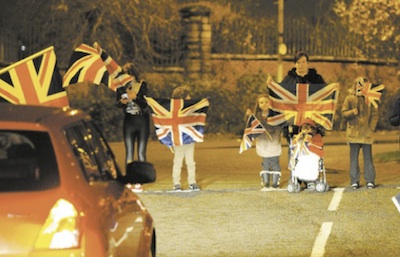
The failure of the PSNI to move small numbers of loyalists from busy public roads has brought Belfast and nearby towns to a halt for several hours at a time this week during some the busiest days of the year.
Rush hour traffic continues to be blocked every evening by groups of loyalists protesting against the decision by Belfast city council to sharply reduce the number of days the British Union Jack flag flies over City Hall.
The PSNI has been accused of pandering to loyalist mobs -- in sharp contrast with their heavy-handed response to republican protests.
Some of the worst street violence for years has followed the vote to fly the Union Jack on only 15 days annually above Belfast City Hall to mark royal events and other commemorations, even though the move only brings Belfast council into line with other councils in the North as well as those in Britain.
While the violence has subsided over the course of this week, masked paramilitaries continue to organise blockades to coincide with the evening rush-hour. Women and children are often used to block the roads.
But most infuriatingly for commuters, the PSNI are routinely allowing the loyalists to break laws against blocking roads and blocking footpaths. Laws against wearing masks, as well as more serious breaches of the peace and acts of violence, are being ignored.
Millions of pounds has also been lost to the North’s economy with Christmas shoppers avoiding the city centre.
A small number of arrests have already been made, but it is tiny in relation to the scale of the law-breaking involved in two weeks of widespread disturbances.
The largest crowd was seen in Belfast city centre on Saturday for a chaotic and openly sectarian protest which saw Irish tricolour flags burned. The protest was addressed by a British right-wing extremist Jim Dowson and was followed by rioting later in east Belfast.
A large crowd of loyalists also closed the Peace Bridge in Derry for a protest on Monday afternoon.
On Monday night, loyalists mounted 43 illegal roadblocks across Belfast, and violence flared in four areas. Some schools were forced to close and the Ulster Hospital in Dundonald was inaccessible for a short period.
Protests have diminished in size and number during the week, and by last [Thursday] night the number of roadblocks had dropped to around a dozen, and without serious disorder.
Almost all of the protests have been organised to disrupt rush-hour traffic by blocking main roads. Most, but not all, have been advertised on the internet.
Villages and towns have also seen one-off protests this week, including Garvagh and Limavady in County Derry, Rathfriland, Ballygowan and Kilkeel in County Down, Portadown and Armagh in County Armagh, Cookstown and Magherafelt in County Tyrone, and Carrickfergus, Ballyclare, Lisburn, and Ballycastle in County Antrim.
An SDLP constituency office in Limavady was vandalised in an expansion of the attacks against the offices and homes of politicians. But it is the cross-community Alliance Party which continues to be the focus of unionist aggression.
The constituency office of Alliance MP Naomi Long on upper Newtownards Road in east Belfast has been a regular target for vandalism and protests. On Monday, it was the scene of a loyalist petrol-bomb attack on a PSNI patrol car, while the nearby home of an Alliance councillor was also attacked.
Ms Long described the violence as “fascist” and “a pogrom”.
“It is completely unacceptable in 2012 that elected representatives of a [political] party are receiving death threats, their offices being burned, their homes being attacked, their families being threatened,” she said.
“This is not what democracy looks like; it is not what loyalism looks like either. It is what fascism looks like and we need to stand firm in the face of fascism - united across these islands to say that this is not acceptable.”
The Alliance Mayor of Larne was today told by the PSNI to evacuate her own home this weekend amid fears of further violence.
On Tuesday, up to 100 loyalist protesters staged a demonstration outside the offices of Limavady borough council while a meeting was taking place inside. Sinn Fein members of the council had to be escorted from the building by PSNI.
And in County Armagh, the husband of a Sinn Fein councillor said his bar was left defenceless as the PSNI ignored his pleas for help. Bernard Rafferty says a PSNI patrol initially ignored his call for help when the Cuchulainn Bar in Armagh was attacked by a large loyalist mob at about 9pm on Monday.
Two fireworks were thrown into the popular pub and windows were smashed by masked youths carrying Union flags.
The well-known landlord, whose wife Cathy is a local councillor, said a tourist who was in the Thomas Street bar was so terrified that he vowed to return south.
“He just sat there and when it was all over he said ‘My God, this can’t be happening’,” he said.
Local Sinn Fein representative Roy McCartney said the PSNI was facilitating “mob rule”.
“The message has to come down from Matt Baggott to stop facilitating these protests and start policing them,” he said.
At a Sinn Fein Mid Ulster selection convention on Wednesday night, Deputy First Minister Martin McGuinness said the decision reached by Belfast city councillors last week was a “vote for compromise” and not a “victory for nationalists”.
“Sinn Fein councillors proposed that there should be no flag flown,” he said. He said the subsequent violent protests were “orchestrated in a very cynical way”.
“Both the UVF and UDA have played a significant role in this orchestration,” he said.
“Unionist leaders, for some reason or other, may now pretend otherwise. We have yet to hear a unionist leader question the role of loyalist paramilitaries in all of this.”
![[Irish Republican News]](https://republican-news.org/graphics/title_gifs/rn.gif)
![[Irish Republican News]](https://republican-news.org/graphics/title_gifs/harp.gif)

